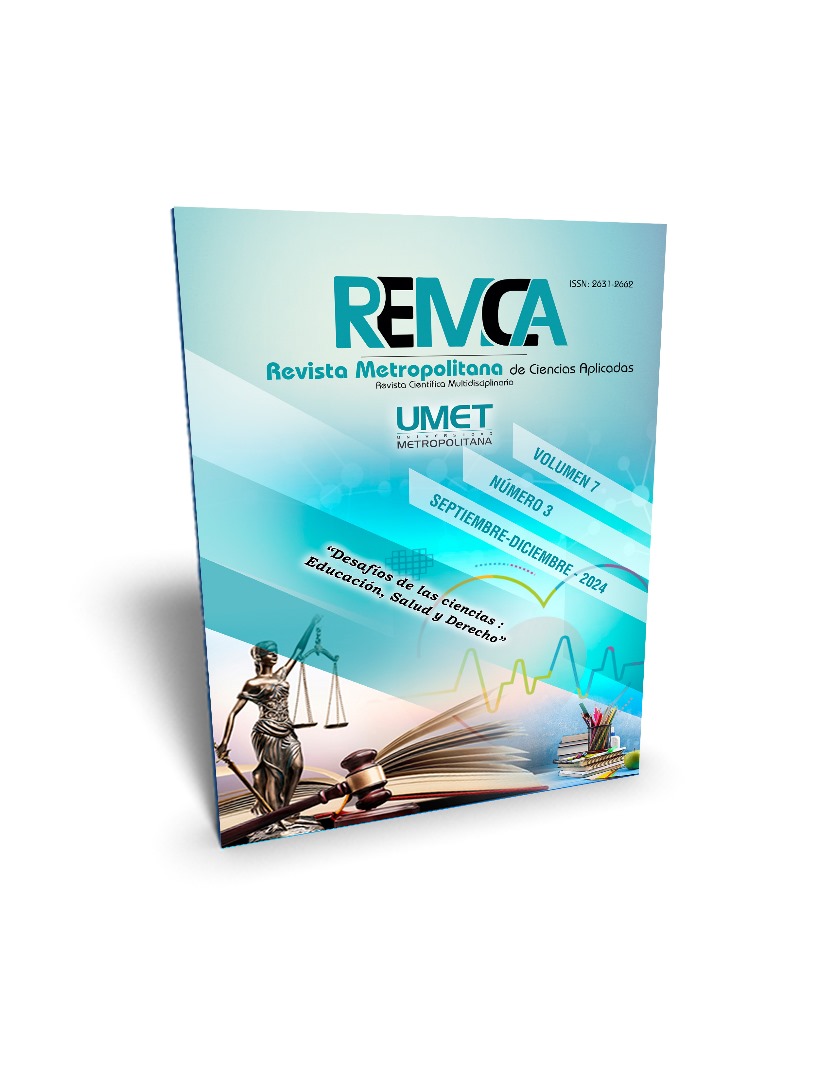Technical defense and effective protection in crimes against sexual integrity in Ecuador
DOI:
https://doi.org/10.62452/2z1s1b83Keywords:
Evidence assessment, crimes against sexual integrity, right to defense, effective judicial protection, ecuadorian criminal practiceAbstract
This scientific article proposes as a general objective: To critically review the incidence of practical behavior of technical defense in cases of crimes against sexual integrity in Ecuadorian criminal practice, on the rights to defense and effective judicial protection. To achieve this, a qualitative approach is used, with scientific methods such as historical-logical, exegetical and analytical-synthetic methods. And, as a research technique, case review. The results show that the practical Ecuadorian criminal behavior, with respect to the technical defense, in cases of crimes against sexual integrity, is characterized by placing the anticipated testimony of the victim at the center of the evidentiary assessment, where, generally, the rights of the parties are restricted, such as, for example, the right of contradiction and the right of equality. And, around these testimonies, there are judicial evidentiary evaluations, from other evidentiary means, such as expert ones, which do not delve into the quality of the evidence, turning out to be very superficial, and subject to a weak technical defense and incapable of guaranteeing the established standards. in due process. Therefore, these evidentiary assessments also turn out to be violative of the Right to defense and the right to effective judicial protection.
Downloads
References
Carrión Lanche, J. A. (2016). El derecho a la defensa como garantía básica del debido proceso. (Trabajo de titulación). Universidad de Guayaquil.
Cevallos Ortega, F. J., & Mena Manzanillas, P. L. (2023). El derecho a la tutela judicial efectiva en la jurisdicción administrativa y el debido proceso en ecuador: el error inexcusable. Revista de Derecho, 8(1), 64-79. https://doi.org/10.47712/rd.2023.v8i1.234
Crespo Mejía, Y. A., Carrión León, K. E., Paredes López, J. A., & Infante Miranda, M. E. (2022). Etapas del proceso penal: importancia de la defensa material y técnica. Revista Universidad Y Sociedad, 14(S4), 70-80. https://rus.ucf.edu.cu/index.php/rus/article/view/3113
Ecuador. Asamblea Nacional Constituyente. (2008). Constitución de la República del Ecuador. Registro Oficial 449. https://www.oas.org/juridico/pdfs/mesicic4_ecu_const.pdf
Ecuador. Asamblea Nacional. (2014). Código Orgánico Integral Penal. Registro Oficial Suplemento 180 https://www.defensa.gob.ec/wp-content/uploads/downloads/2021 /03/COIP _act_feb-2021.pdf
Maza Agreda, K. M. (2022). Valoración del testimonio anticipado en delitos sexuales como prueba trascendental del tribunal penal de Santo Domingo. (Trabajo de titulación). Universidad Autónoma Regional de Los Andes.
Pesántez Márquez, N. E. . (2023). El proceso probatorio en los delitos sexuales en Ecuador. Didáctica Y Educación ISSN 2224-2643, 14(5), 416–438. Recuperado a partir de https://revistas.ult.edu.cu/index.php/didascalia/article/view/1891
Piñas Piñas, L. F., Viteri Naranjo, C. B., & Hernández Moina, M. L. (2020). El derecho a la defensa técnica en las garantías jurisdiccionales en Ecuador. Uniandes Episteme, 7, 1022–1033. https://revista.uniandes.edu.ec/ojs/index.php/EPISTEME/article/view/2278
Prado Falconí, F., & Sotomayor Plaza, J. (2022). Vulneración de la garantía del debido proceso en el derecho a la defensa del investigado, afectado por la toma del testimonio anticipado en delitos sexuales. Revista Metropolitana De Ciencias Aplicadas, 5(1), 89-95. https://doi.org/10.62452/k1p6cs56
Salame Ortiz, M. A., Pérez Mayorga, B. C., & San Lucas Solórzano, M. F. (2020). La víctima en los delitos contra la integridad sexual. Universidad Y Sociedad, 12(3), 353–363. https://rus.ucf.edu.cu/index.php/rus/article/view/1595
Soledispa Toro, A. R. (2017). Tutela judicial efectiva para víctimas de delitos sexuales en el sistema penal ecuatoriano. (Tesis Maestría). Universidad Andina Simón Bolívar.
Villavicencio Quezada, L. A. (2023). Análisis del testimonio anticipado de la víctima en los delitos sexuales como prueba insuficiente para la condena del acusado en el Ecuador. (Tesis Maestría). Universidad de Barcelona.
Vinueza-Arroyo, G. F., Silva-Andrade, G. J., & Villamarín-Barragán, F. D. (2019). El procedimiento expedito en contravenciones penales, la tutela judicial efectiva y el debido proceso en el Ecuador. Dominio De Las Ciencias, 5(2), 536–553. https://doi.org/10.23857/dc.v5i2.1106
Zurita Valverde, A. J. (2023). La revictimización en los delitos sexuales en el procedimiento penal ecuatoriano, en Ibarra, 2022. (Trabajo de titulación).Universidad Técnica del Norte.
Downloads
Published
Issue
Section
License
Copyright (c) 2024 Wendy Sugey Alvarado-Medina, Yudith López-Soria, Holger Geovanny García-Segarra (Autor/a)

This work is licensed under a Creative Commons Attribution-NonCommercial-ShareAlike 4.0 International License.
Authors who publish in Revista Metropolitana de Ciencias Aplicadas (REMCA), agree to the following terms:
1. Copyright
Authors retain unrestricted copyright to their work. Authors grant the journal the right of first publication. To this end, they assign the journal non-exclusive exploitation rights (reproduction, distribution, public communication, and transformation). Authors may enter into additional agreements for the non-exclusive distribution of the version of the work published in the journal, provided that acknowledgment of its initial publication in this journal is given.
© The authors.
2. License
The articles are published in the journal under the Creative Commons Attribution-NonCommercial-ShareAlike 4.0 International License (CC BY-NC-SA 4.0). The terms can be found at: https://creativecommons.org/licenses/by-nc-sa/4.0/deed.en
This license allows:
- Sharing: Copying and redistributing the material in any medium or format.
- Adapting: Remixing, transforming, and building upon the material.
Under the following terms:
- Attribution: You must give appropriate credit, provide a link to the license, and indicate if any changes were made. You may do this in any reasonable manner, but not in any way that suggests the licensor endorses or sponsors your use.
- NonCommercial: You may not use the material for commercial purposes.
- ShareAlike: If you remix, transform, or build upon the material, you must distribute your creation under the same license as the original work.
There are no additional restrictions. You may not apply legal terms or technological measures that legally restrict others from doing anything the license permits.




